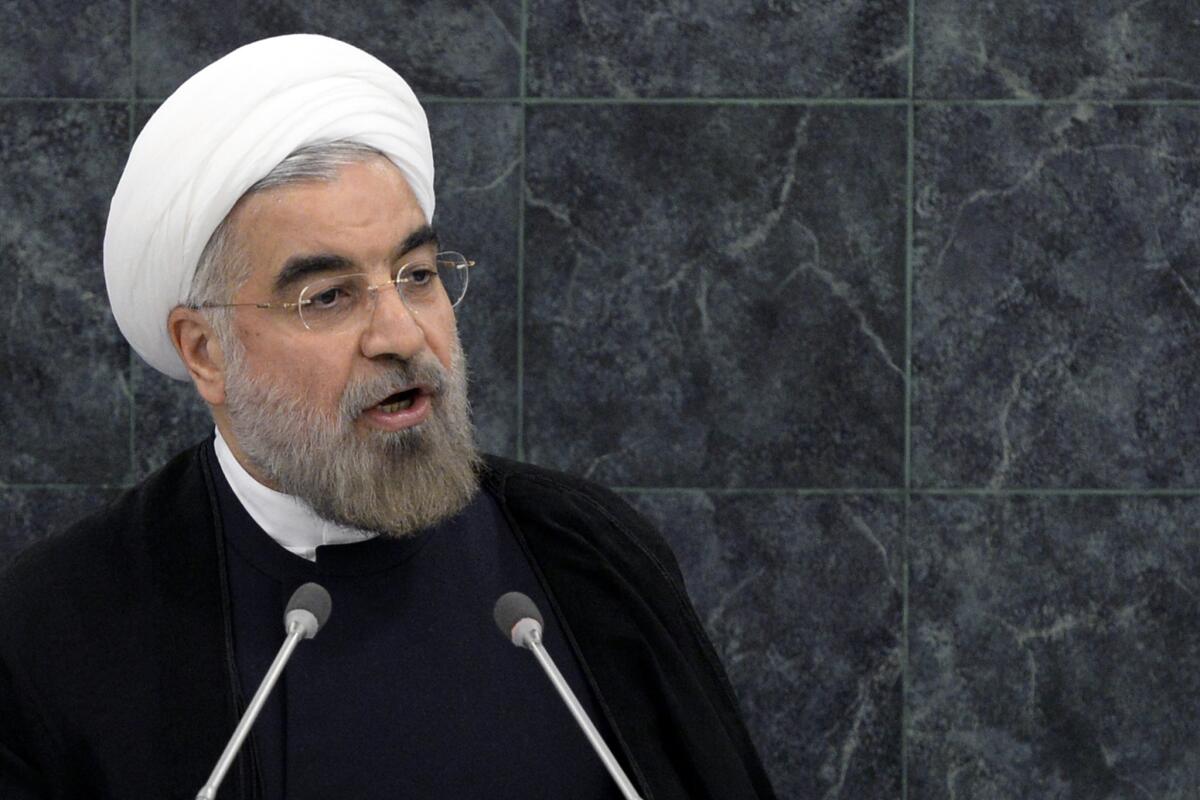The answer on Iran? Yes.

After years of fruitless negotiations, the United States may soon face an unfamiliar problem in its long confrontation with Iran: Are we willing to take yes for an answer?
Negotiators are scheduled to meet again in Geneva this week to try to move toward an agreement that would put reliable limits on Iran’s nuclear program — limits strong enough to reassure other countries that the mullahs cannot build a nuclear weapon.
Officials on both sides say they are still a long way from a deal, but they also describe the talks as an important moment of opportunity. Iran’s new president, Hassan Rouhani, wants a deal to lift the international sanctions that are crippling his country’s economy, something he promised to try to achieve during his election campaign last spring.
The challenge, of course, is that Iran wants minimal limits on its freedom but maximum relief from economic sanctions. The United States and its allies want the opposite combination, a deal that would dismantle much of Iran’s nuclear program before most sanctions are lifted.
And the two sides will have to cut their deal in the face of intense mistrust and political sniping on both sides. Only last week, Iranian hard-liners staged their annual “Death to America” rally outside the long-shuttered U.S. Embassy in Tehran, and Iran’s supreme leader, Ayatollah Ali Khamenei, felt compelled to defend his negotiators against charges that they are giving too much away.
On Capitol Hill, meanwhile, American hard-liners have made it clear they want to toughen sanctions on Iran, not relax them.
“Sanctions are the only way to prevent a war,” Sen. Mark Steven Kirk (R-Ill.) said last week. “Just leave [them] in place and let the Iranians run out of money.”
Sen. Robert Menendez (D-N.J.), chairman of the Senate Foreign Relations Committee, has drafted a bill to escalate sanctions further.
One positive sign: Both sides have agreed on a structure for the talks. In a first phase, between now and the end of the year, they’ll try to reach an interim agreement that would freeze Iran’s nuclear program in exchange for what U.S. officials have described as modest relief from sanctions. As described by U.S. negotiator Wendy Sherman, the idea would be to “put time on the clock … so we have time to negotiate a comprehensive agreement.” An important part of the interim deal, she told an Israeli television interviewer, would be that any sanctions relief be “limited, temporary [and] reversible.”
Under one proposal being discussed, Iran would get access to some of the billions of dollars in oil earnings that the sanctions have effectively frozen in bank accounts around the world — but the regulations that froze the assets would remain in place, and the money could be turned on and off like a spigot, depending on Iran’s behavior.
That’s phase one. Phase two would be another round of negotiations to reach a final deal — one that, in U.S. eyes, would include limits on Iran’s nuclear program so strenuous that no other country, including Israel, would worry about Iranian nuclear weapons again.
To Western nuclear experts, such an agreement would have to cover a daunting list of issues. It would need to eliminate Iran’s stockpile of highly enriched uranium, either by shipping it out of the country or by reducing it to a less dangerous form. It would need to limit Iran’s ability to enrich nuclear fuel by reducing the number of centrifuges in the country. It would need to stop the new Arak nuclear reactor from producing plutonium. And it would need to impose intrusive international monitoring to ensure that the agreement was kept.
But to get such a deal, the United States and its allies would almost surely have to relax one long-standing demand: that Iran end all nuclear enrichment.
From Iran’s standpoint, that is a deal-breaker, warned Robert Einhorn, a State Department nuclear negotiator during the Clinton and Obama administrations. “Rouhani and his negotiating team have … indicated a willingness to accept constraints on a domestic enrichment program, but never a willingness to give it up altogether,” he said. “The hard-liners [in Tehran] would pounce on any deal that could be portrayed as a humiliating surrender.”
On Capitol Hill, too, the hard-liners are waiting to pounce. For years, the U.S. position has been that Iran must end its enrichment program, and pro-Israel organizations say that should still be the goal. And Congress is still discussing tougher sanctions, a move Obama administration officials say would backfire by causing the negotiations to collapse (and potentially cause international sanctions to unravel too).
Congress should back off. In recent history, moments of opportunity between Iran and the U.S. have been rare. This one shouldn’t go to waste.
A nuclear deal with Iran, if one can be struck, will deserve tough scrutiny. But we have to be willing to take yes for an answer.
Twitter: @DoyleMcManus
More to Read
A cure for the common opinion
Get thought-provoking perspectives with our weekly newsletter.
You may occasionally receive promotional content from the Los Angeles Times.







